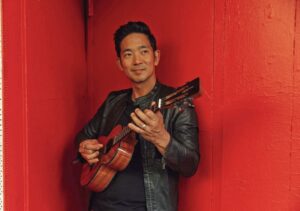The ukulele is not an intimidating instrument, says Jake Shimabukuro. “Even if you’ve never played an instrument before,” he says, “you’re not afraid to pick it up and try it.” Indeed, the small four-string cousin of the guitar is a common sight at school talent shows and around campfires.

The ukulele’s range is similar to that of a typical human voice — two octaves. “It’s very simple,” says Shimabukuro. “I always tell people that if they can hum the song, they can play it on the ukulele.”
But when Shimabukuro plays the ukulele, it is transformed. In his hands, the humble instrument becomes a tool for virtuosic, intricate musical expression. He’s played it since he was four when he was handed a ukulele by his mother, who also played. On Aug. 26, Shimabukuro will perform under the Payomet tent, joined by Jackson Waldhoff on bass. He will play some older songs along with selections from his 2024 album, Blues Experience, a collaboration with drummer Mick Fleetwood of Fleetwood Mac.
Shimabukuro grew up in Honolulu, where he still lives. He joined his first band right out of high school: a trio, Pure Heart, which played “traditional and contemporary Hawaiian island music,” he says. That’s when he discovered his love for live performance. “I was so shy,” he says. “Music was my way of connecting to a greater community and feeling a part of something bigger than myself.”
In the early 2000s, he embarked on a solo career, playing around Hawaii and in Japan. He has since performed at Lincoln Center and the Sydney Opera House; he’s collaborated with Jimmy Buffett and Yo-Yo Ma; and he’s been releasing albums in Japan and the United States since 2002. In 2021, President Joe Biden nominated Shimabukuro to be a member of the National Council on the Arts.
Over the years, Shimabukuro says, he’s accumulated “a good dozen” ukuleles. His main instrument is a Kamaka — made by a Hawaiian company that is more than 100 years old and beloved by ukulele players, he says: “Growing up, that was the ukulele that everybody wanted. My ukulele heroes all played Kamakas.” Those heroes include virtuosos Eddie Kamae, Ohta-San, and Peter Moon, who all “pushed the boundaries of the instrument,” says Shimabukuro. Ohta-San, who was Kamae’s student, played everything from jazz to bossa nova to Bach.
In his own playing, Shimabukuro isn’t limited by the instrument’s simplicity. He has a tenor ukulele — at about 27 inches long, it’s seven inches longer than the standard soprano size and has several more frets. It has a deeper, richer voice than a standard ukulele, and with the right technique, he can further manipulate that sound.
“A really good ukulele is a sensitive instrument,” he says. “The way you attack the strings, the angle of your fingertips, and how you strum the strings will all affect the timbre and the tone. You can make one instrument sound like many different instruments.”
This adaptability lends itself to collaboration, something Shimabukuro actively seeks. “It doesn’t even have to be another musician,” he says. “It could be a dancer, a photographer, a videographer, a writer, a poet. Anybody who has a creative spirit.”
Shimabukuro’s Blues Experience, an album of mostly blues standards, was an intensive exercise in collaboration: Every song was recorded live in Fleetwood’s Maui studio over the course of two three-day sessions, says Shimabukuro. “It was all very spontaneous, with a lot of improvisation,” he says. “I loved it.”
On the album’s blues songs, Shimabukuro’s ukulele sounds just like an electric guitar; the high notes wail, the low notes thrum. Part of this is due to effects: to achieve the sound, Shimabukuro used Fleetwood’s Fender guitar amp as well as a wah-wah pedal, delay pedals, and a looper.
On “Rollin’ N Tumblin’,” Shimabukuro fades in over Fleetwood’s thudding drums before settling into the song’s echoing, sultry melody. “When Fleetwood plays the drums,” Shimabukuro says, “it’s an event.” Under Shimabukuro’s fast-paced runs, Fleetwood’s drums are a steady musical heartbeat. “He plays with so much conviction,” says Shimabukuro. “You feel that kick drum. You feel every backbeat on his snare.”
The album’s fourth track, “Kula Blues,” is a Shimabukuro original. This tune continues the album’s upbeat trajectory. The ukulele turns into a swinging, jazzy voice. Shimabukuro flips and dances over Fleetwood’s driving, syncopated beats. “Songbird,” a cover of Fleetwood Mac, is another story entirely. It’s misty and atmospheric: the drums are just barely there, and over the top, Shimabukuro’s ukulele speaks with a folky sweetness inherent to the instrument.
No matter what he plays, Shimabukuro is fluent, his hands moving as if with minds of their own. At this point, “it’s an extension of my body,” he says. When he’s immersed in a piece of music, he and the ukulele become equal partners: “It almost feels like the instrument is playing me.”
Heartstrings
The event: Jake Shimabukuro performs on the ukelele
The time: Tuesday, Aug 26, 7 p.m.
The place: Payomet Performing Arts Center, 29 Old Dewline Road, North Truro
The cost: $32 to $38 at payomet.org
